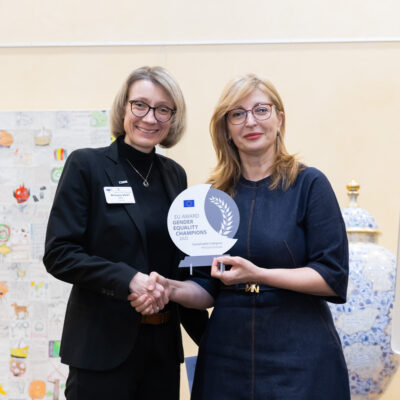Künstliche Intelligenz versucht, die menschliche Problemlösefähigkeit nachzubilden. Doch „denkende“ technische Systeme sind nicht automatisch in der Lage, sich in Menschen hineinzuversetzen und der Situation angemessen mit ihnen zu interagieren. Vor zwölf Jahren sind Forschende der Universität Bielefeld mit dem Exzellenzcluster CITEC angetreten, Technologie zu entwickeln, die sich an den Menschen anpasst. Auf der CITEC-Konferenz 2019 am 24. und 25. Oktober stellen die Wissenschaftlerinnen und Wissenschaftler die Ergebnisse ihrer Arbeit vor und diskutieren, wie sie ihren Ansatz der Kognitiven Interaktionstechnologie in Zukunft weiterentwickeln. Der Titel der Konferenz im CITEC-Gebäude: „Cognitive Interaction Technology meets AI“ (Kognitive Interaktionstechnologie trifft Künstliche Intelligenz). Die bekannten Robotikforscher Professor Dr. Hiroshi Ishiguro aus Japan und Professor Dr. Giulio Sandini aus Italien halten die Keynote-Vorträge. Beide Vorträge sind öffentlich.
Professor Dr. Hiroshi Ishiguro von der Universität Osaka spricht in seinem Keynote-Vortrag am ersten Tag der Konferenz (24. Oktober) ab 14 Uhr über „Studies on Interactive Robots” (Untersuchungen zu Interaktiven Robotern). Die Universität Osaka ist strategischer Partner von CITEC. Ishiguro entwickelt Roboter, die Menschen möglichst ähnlich sehen. Der Keynote-Vortrag am zweiten Tag (25. Oktober) beginnt um 9 Uhr und trägt den Titel „From Humanoid Robots to Anthropomorphic Minds“ (Von humanoiden Robotern zum menschenähnlichen Verstand). Der Referent Professor Dr. Giulio Sandini ist Direktor des Italian Institute of Technology (IIT) und hat dort mit anderen Forschenden den kleinkindartigen Roboter „iCub“ entwickelt. Während für die Teilnahme an der Gesamtkonferenz eine Registrierung erforderlich war, können Interessierte die beiden Keynote-Vorträge im Hörsaal des CITEC-Gebäudes ohne Anmeldung besuchen.
In den rund 20 Vorträgen der Konferenz geht es zum Beispiel um die Großforschungsprojekte des Exzellenzclusters CITEC, darunter die „fürsorgliche“ Wohnung mit Servicerobotern oder die virtuelle Trainingsumgebung ICSpace, die etwa Sportlerinnen und Sportler beim Bewegungstraining unterstützt. Auch werden Projekte der strategischen Partnerschaften des Exzellenzclusters CITEC vorgestellt. So haben CITEC-Forschende in Projekten mit den v. Bodel-schwingschen Stiftungen Bethel den virtuellen Assistenten und Tagesbegleiter „Billie“ entwickelt. In weiteren Vorträgen erzählen zwei CITEC-Wissenschaftlerinnen, wie die Zeit am Exzel-lenzcluster ihre Forschung bis heute beeinflusst.

Foto: CITEC/Universität Bielefeld
Den Auftaktvortrag der Konferenz halten der CITEC-Koordinator Professor Dr. Helge Ritter und seine Stellvertreterin Professorin Dr. Britta Wrede am 24. Oktober um 9.05 Uhr. Sie gehen darauf ein, wie Kognitive Interaktionstechnologie die Forschung an Künstlicher Intelligenz (KI) bereichern kann. „Künstliche Intelligenz wird uns häufig gewissermaßen körperlos über PCs und Smartphones vermittelt“, sagt Helge Ritter. „Wir Menschen sind aber vor allem gewohnt, dass sich unser Interaktionspartner mit seinem Körper mit uns im selben Raum befindet. Unser Ansatz befasst sich mit solchen natürlichen Situationen und geht davon aus, dass wir ver-stehen können, was dabei im Denken eines Menschen vor sich geht. Diese Erkenntnisse übertragen wir auf technische Systeme wie Roboter oder Dialogassistenten.“ Dabei macht sich die CITEC-Forschung Methoden aus der KI-Forschung zunutze, etwa das überwachte Lernen oder Deep Learning.
Diskussion zum Einfluss von Technologie auf das Menschenbild
Technologieeinsatz und die Gewöhnung an technische Systeme beeinflussen die Einstellungen und das Verhalten von Menschen. Über dieses Thema sprechen unter anderem die beiden Keynote-Referenten bei der Podiumsdiskussion „The Other Intelligence: How Will Technology Change our Concept of the Human Being?“ (Die andere Intelligenz: Wie Technologie unser Menschenbild verändert) am 24. Oktober ab 16.30 Uhr. Wie die Keynote-Vorträge ist auch die Podiumsdiskussion öffentlich.
Auf dem Vorprogramm der CITEC-Konferenz 2019 steht ein „Science Cinema spezial“ mit Hiroshi Ishiguro am Mittwoch, 23. Oktober, ab 19 Uhr im Kamera Filmkunsttheater in Bielefeld. Präsentiert wird der japanische Spielfilm „Sayōnara“, gefolgt von einem Gespräch von Hiroshi Ishiguro und Helge Ritter. Das Science-Fiction-Drama gilt als erster Spielfilm mit einem Androiden als Schauspieler.
Der Exzellenzcluster CITEC hat seine Arbeit im November 2007 aufgenommen. Ende Oktober läuft die Förderung des Exzellenzclusters aus. Als Institut der Universität Bielefeld setzt CITEC auch in Zukunft seine Forschung zu intelligenten technischen Systemen fort, die sich an Menschen anpassen und sie so zu Hause und im Beruf unterstützen.
Weitere Informationen:
• Programm der Konferenz
• „Science Cinema spezial“ mit Professor Dr. Hiroshi Ishiguro
Artificial intelligence attempts to emulate human problem-solving abilities. That said, “thinking” technical systems are not automatically able to put themselves in other people’s shoes and interact with them according to the particularities of the situation. With the establishment of the Cluster of Excellence Cognitive Interaction Technology 12 years ago, researchers began working on developing technology that adapts to the human user. At the 2019 CITEC Conference from 24–25 October 2019, re-searchers will present the fruits of their research and discuss how their approaches can contribute to future advancements in the field of cognitive interaction technology. The conference, which will be held at the CITEC Building, is called “Cognitive Interaction Technology Meets AI.” Renowned robotics researchers Professor Dr. Hiroshi Ishiguro from Japan and Dr. Guilio Sandini of Italy will deliver the keynote lectures. Both talks will be open to the public.
On the first day of the conference (24 October, at 2:00pm) Professor Dr. Hiroshi Ishiguro of Osaka University will give his keynote lecture titled “Studies on Interactive Robots.” Osaka University is a strategic partner of CITEC. Ishiguro develops humanoid robots that resemble humans to a remarkable degree. On the second day of the conference (25 October, at 9:05 am), Professor Dr. Giulio Sandini will deliver a talk titled “From Humanoid Robots to Anthropomorphic Minds.” At the Italian Institute of Technology, where Dr. Sandini also serves as director, he and his colleagues have developed a child-like robot called iCub. While registration is required to attend the entire conference, the keynote lectures are open to the public (without needing to register) in the lecture hall of the CITEC Building.
Some 20 talks will be given at the conference on topics including large-scale research projects at CITEC, such as the “caring” apartment with service robots, or the ICSpace virtual training environment that provides assistance for athletic training. Projects featuring strategic partnerships of the Cluster of Excellence CITEC will also be presented. In strategic projects between CITEC researchers and the v. Bodelschwingh Bethel Foundation, for instance, virtual assistants and “Billie,” a companion for daily living, where de-veloped. In other talks, two CITEC researchers will speak about how their time at the Cluster of Excellence continues to influence their work to the present day.
Endowing Technical Systems with Natural Behavior
The kick-off talk to the conference will be given by CITEC Coordinator Professor Dr. Helge Ritter and his Deputy Coordinator Professor Dr. Britta Wrede on 24 October at 9:05 am. They will talk about how cognitive interaction technology can enrich research on artificial intelligence. “Artificial intelligence is often delivered to us in a kind of ‘unembodied’ manner – via computer and Smartphones,” says Helge Ritter. “We humans, however, are used to having the partner we’re interacting with be in the same space – and have a physical body. Our approach encompasses these kinds of natural situations and assumes we can understand what’s going on in a person’s mind. We apply these findings to technical systems such as robots and speech assistants.” CITEC research makes use of methods from artificial intelligence, such as supervised learning and deep learning.
Discussing the Influence of Technology on Our Understanding of the Human
Both the use of technology and familiarization with technical systems influence people’s attitudes and behaviors. This is a topic that will be addressed by both keynote speakers, among others, in the panel discussion “The Other Intelligence: How Will Technology Change Our Concept of the Human Being?” Like the keynote lectures, this panel discussion (held on 24 October at 4:30pm) is also free and open to the public.
As part of the pre-programme to the CITEC Conference, “Science Cinema spezial” with Hiroshi Ishiguro will take place on Wednesday, 23 October, at 7pm in Bielefeld’s Kamera Filmkunsttheater (Kamera art cinema). The Japanese film “Sayōnara” will be screened, followed by a discussion with Hiroshi Ishiguro and Helge Ritter. The science-fiction drama is considered to be the first film featuring an android robot as an actor.
The Cluster of Excellence CITEC began its work in November 2007. At the end of October this year, the Cluster of Excellence funding will be coming to an end. As an institute of Bielefeld University, CITEC will continue its research on intelligent technical systems that adapt to their human users to provide support at home and in the workplace.
More information
The conference




